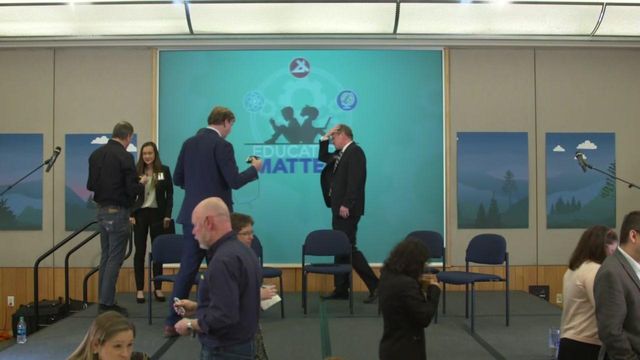Racial inequity, rural issues among group's top concerns for North Carolina schools
The Public School Forum of North Carolina released its annual list of the top 10 education issues Wednesday.
Posted — UpdatedForum President and Executive Director Keith Poston asked state leaders to "remember the value of public education in our society and re-commit our state to traditional public schools, educators and students." He made the announcement during the group's fifth annual Eggs & Issues Breakfast in Raleigh.
“The erosion of North Carolina’s commitment to public schools for the public good is clear,” Poston said. “The emphasis on choice and competition has led us astray from the intended purpose of public schools with a narrative that has often blamed teachers and school leaders for perceived failures, when in reality we should focus on systemic inequities and our own dismantling of support for and trust in our schools.”
“It is time to reverse course and commit to implementing policies and increasing funding levels that will ensure that all of our children have equitable access to a rigorous education that will prepare them to be the thoughtful, empathetic and creative leaders that we need for our future,” Poston added.
Joseph Kyzer, communications director for North Carolina House Speaker Tim Moore, responded to Poston's statements about school choice on Wednesday.
- Renew North Carolina’s commitment to public schools for the public good
- Target rural North Carolina’s unique education challenges
- Directly address persistent racial inequities in North Carolina’s schools
- Seize historic opportunity to advance adequacy and equity in school funding
- Recognize that teacher recruitment and retention starts with professional treatment
- Strengthen charter school and private school voucher transparency and accountability
- Eliminate stress and stigma in testing and accountability policy
- Start at the top by investing in school leaders
- Thoughtfully and strategically invest in school safety
- Focus on whole child, whole day
In its list, the Public School Forum also examined teacher recruitment and retention, gaps and shortfalls in school funding, racial equity in schools and transparency and accountability in the state’s private school voucher program.
New this year is the call to focus on the unique education challenges of rural North Carolina and address rural funding challenges through school finance reforms.
“North Carolina is home to 568,000 rural students, the second largest rural student population in the United States, after Texas,” said Poston. “In North Carolina, 62 percent of rural, non-metro students qualify for free or reduced lunch compared to 46 percent for urban students.”
In its recommendations, the forum asks state leaders to address rural funding challenges through school finance reforms, focus more attention on rural teacher recruitment and retention, and address the broadband access gap – sometimes referred to as the homework gap – for students. According to the FCC, 6.29 percent of North Carolina households do not have access to high-speed broadband, and 95 percent of those disconnected households are in rural areas of the state.
This year, the Public School Forum highlighted the impact of the rapidly growing number of charter schools in the state.
“The charter school landscape looks very different now than in the early days when they were promoted as ‘laboratories of innovation,’ incubating new teaching practices and school models that could be scaled up,” Poston said. “Today, as the number of charters has doubled in the past eight years, one-fifth of North Carolina’s charter schools are operated by for-profit charter management companies, 80 percent of which are headquartered outside of the state, far away from the communities they purport to serve with educational innovations sensitive to local needs.”
The number of charter schools in North Carolina has nearly doubled since 2011, when lawmakers lifted the 100-school cap.
Racial and ethnic inequity in schools was another top issue for the forum this year. Lauren Fox, senior director of policy for the Public School Forum, called on state leaders to invest in ongoing teacher training to foster racial equity, create effective pathways to promoting greater diversity in the teacher pipeline and recommit to creating and sustaining integrated schools and classrooms.
“For a variety of moral and economic reasons, the persistent racial inequity in our schools should be a clarion call to state and local policymakers that it is past time to implement policies that will effectively and fairly serve the needs of ALL students in our state to lead us to a more just, equitable, and successful future,” Fox said in a statement.
Related Topics
• Credits
Copyright 2024 by Capitol Broadcasting Company. All rights reserved. This material may not be published, broadcast, rewritten or redistributed.






